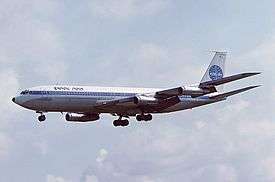Pan Am Flight 806
 A Pan Am B707-321B in flight | |
| Accident summary | |
|---|---|
| Date | January 30, 1974 |
| Summary | Microburst-induced wind shear |
| Site |
0.8 mi (1.3 km) from Pago Pago International Airport, American Samoa 14°20′55″S 170°43′55″W / 14.34861°S 170.73194°WCoordinates: 14°20′55″S 170°43′55″W / 14.34861°S 170.73194°W |
| Passengers | 91 |
| Crew | 10 |
| Fatalities | 97 |
| Injuries (non-fatal) | 4 |
| Survivors | 4 |
| Aircraft type | Boeing 707-321B |
| Aircraft name | Clipper Radiant |
| Operator | Pan American World Airways |
| Registration | N454PA |
| Flight origin | Auckland International Airport |
| 1st stopover | Pago Pago International Airport |
| 2nd stopover | Honolulu International Airport |
| Destination | Los Angeles International Airport |
Pan Am Flight 806, operated by Pan American World Airways Boeing 707-321B N454PA (Clipper Radiant), was an international scheduled flight from Auckland, New Zealand, to Los Angeles, California, with intermediate stops at Pago Pago, American Samoa and Honolulu, Hawaii. On January 30, 1974, it crashed on approach to Pago Pago International Airport, killing 87 passengers and ten crew members.
Accident cause and description
The flight deck crew consisted of Captain Leroy Peterson (52), First Officer Richard Gaines (37), Third Officer James Phillips (43), and Flight Engineer Gerry Green (37). The six cabin crew were Stewardess Yvonne Cotte (23), Purser Elizabeth Givens (30), Stewardess Gloria Olson (25), Stewardess Patricia Reilly (25), Purser Gerda Rupp (34), and Stewardess Kinuko Seko (28).
The crew of 10 and 87 passengers ultimately died. Notably, all the passengers and crew survived the initial impact.
Nine passengers and one crew member, Third Officer Phillips, survived the initial crash and post-accident fire. One passenger died the day after the accident. Three days after the accident, the remaining crew member and three passengers died.[1] One passenger counted as a survivor by NTSB died nine days after the accident.[2]
The National Transportation Safety Board determined that the probable cause of the crash was the flight crew's late recognition, and failure to correct in a timely manner, an excessive descent rate which developed as a result of the aircraft's penetration through destabilizing wind changes. The winds consisted of horizontal and vertical components produced by a heavy rainstorm and influenced by uneven terrain close to the aircraft's approach path. The captain's recognition was hampered by restricted visibility, the illusory effects of a "black hole" approach, inadequate monitoring of flight instruments, and the failure of the crew to call out descent rate during the last 15 seconds of flight.[1]
References
- 1 2 "AAR77-07." National Transportation Safety Board. Retrieved on June 10, 2009. 4 (8/46).
- ↑ "AAR77-07." National Transportation Safety Board. Retrieved on June 10, 2009. Synopsis (5/46).
External links
- Accident description at the Aviation Safety Network
- NTSB Accident Report (PDF file)